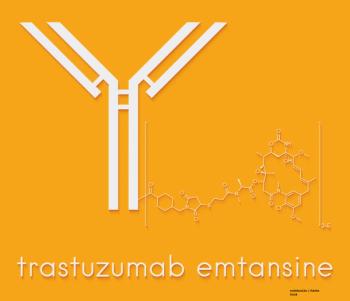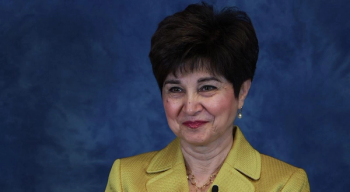
Several different driver mutations acquired during treatment for breast cancer can help explain acquired resistance to the combination of palbociclib and fulvestrant.

Your AI-Trained Oncology Knowledge Connection!


Several different driver mutations acquired during treatment for breast cancer can help explain acquired resistance to the combination of palbociclib and fulvestrant.

Tumor gene expression testing identifies women with certain early-stage breast cancers who can safely skip chemotherapy.

Adding pembrolizumab to pemetrexed and carboplatin for advanced nonsquamous NSCLC is associated with improved overall survival at 24 months.

Pembrolizumab represents a new standard first-line treatment option for PD-L1–expressing advanced/metastatic NSCLC, according to KEYNOTE-042 investigators.

The presence of MSI-high was predictive of Lynch syndrome, which was found to be associated with a much wider spectrum of cancers than previously thought.

The PI3K inhibitor taselisib offered less dramatic clinical benefits than anticipated, and with significant toxicities.

Genetic sequencing of tumors to identify targeted therapy options appears to delay tumor progression and prolong patient survival.

A simple blood draw to evaluate cfDNA might one day be used for early-stage lung cancer screening-if the mutational “noise” of normal aging can be addressed.

The addition of atezolizumab to chemotherapy was associated with superior PFS but did not improve preliminary OS.

In this podcast, ASCO Educational Book contributor Dr. Shilpa Grover, from Brigham and Women’s Hospital, describes GI and hepatic AEs encountered in patients on ICI therapy.

Pembrolizumab has shown activity against some lung cancer metastases in the brain, but responses can be discordant with extracranial tumor responses.

A California study showed women are significantly undertreated for head and neck cancer, with several factors possibly accounting for the disparity.

The use of geriatric assessment in routine care of older patients with advanced cancer may significantly improve doctor-patient communication.

Medical oncologist Ryan J. Sullivan shared some interesting melanoma-related presentations from the 2018 ASCO Annual Meeting.

In a CYCORE trial, mobile technology improved patient tracking, enabling clinicians to detect concerning symptoms early and respond quicker.

Women with HER2-positive early breast cancer achieved similar disease-free survival with 6 months of adjuvant trastuzumab compared with a 12-month duration, according to the phase III PERSEPHONE trial.

A study led by Dr. Jun Mao of MSKCC found CBT and acupuncture each yielded clinically meaningful and durable sleep-related QOL improvements.

This video reviews the biology of secondary acute myeloid leukemia and highlights some of the latest findings in the treatment of this disease.

The primary tumor location was an independent prognostic marker in patients with RAS wild-type metastatic colorectal cancer after multivariable adjustment.

This video highlights results of the SUNSHINE study, which found that high-dose vitamin D added to standard treatment slowed disease progression in newly diagnosed metastatic colorectal cancer.

In this peer-to-peer discussion two experts discuss the nuances and challenges of treating elderly patients with myeloma, and why therapies need to be tailored based on frailty status rather than age.

This video examines how a change to weight-based pembrolizumab dosing in first-line PD-L1–positive lung cancer could save nearly $1 billion in US healthcare costs.

This video highlights the latest studies presented at the 2017 ASCO Annual Meeting on the treatment of HER2-positive breast cancer.

This video examines clinical and genomics data from the NCI 9012 trial, which studied abiraterone combined with a PARP inhibitor in patients with metastatic castration-resistant prostate cancer.

This video examines challenges and opportunities in getting older patients with cancer enrolled in clinical trials.

This video reviews results of LUX-Head & Neck 2, a randomized phase III trial that studied afatinib as adjuvant therapy in patients with unresected squamous cell head and neck cancer.

Dr. Karen Reckamp talks about ways to incorporate biomarkers for the treatment of lung cancer with immunotherapy into clinical practice at the 2017 American Society of Clinical Oncology Annual Meeting, held June 2–6 in Chicago.

The second-generation ALK-inhibitor alectinib should be the new standard of care for first-line treatment of ALK-positive non–small-cell lung cancer, according to a new study.

A new study found that patients with mCRPC had higher PSA response with enzalutamide vs abiraterone, but no difference in time to progression, and reported worse outcomes in those with quantifiable ctDNA.

This video highlights a clinical-genomic risk classification system that is highly prognostic for distant metastasis and more accurate than clinical risk assessments.